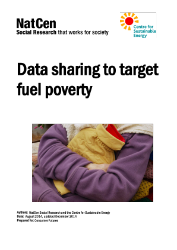Data sharing to target fuel poverty
On this page

Data sharing to target fuel poverty 1.49 MB presents the findings of research carried out for Citizens Advice by the Centre for Sustainable Energy and NatCen in how improved data use by energy suppliers and other organisations could improve the targeting and effectiveness of fuel poverty initiatives.
The report explores the data sharing opportunities that exist and identifies barriers and risks associated with their use.
While this research has a particular focus on the role of data in improving the targeting of fuel poverty programmes, many of the issues raised and solutions discussed have much wider implications for social programmes aiming to use and share data more generally.
Policy Manager Peter Broad's blog
Finding the fuel poor: Using data to help energy consumers

There are various benefits of data sharing: It can help policy makers and public authorities make more informed decisions and allow more joined up approaches to service delivery. It can help public bodies better understand their populations, meaning that they can become better at targeting services to meet the needs of specific groups.
Through better targeting, and by removing the need for additional data collection,, it can reduce the cost of delivering policies. The administrative burden on individuals is also reduced when they are not required to provide the same information to separate bodies.
But these benefits can come at a cost, for example, increased risks of data loss or concerns about the dissemination of inaccurate information. Such risks can be exacerbated where sensitive data is involved, as is the case with some data typically discussed in relation to targeting fuel poverty.
The report looks at how fuel poverty is defined, the different types of fuel poor households that exist, the current policies being used to target the fuel poor, the kinds of data used for these policies, and how effective they are in reaching the fuel poor.
It explores the issues around further data sharing to support fuel poverty through the following themes:
Accuracy and technical issues
Legal considerations
Ethical concerns and public perceptions
Cost
Institutional culture
The research used existing literature, stakeholder interviews and a stakeholder workshop to investigate these issues. It also drew on a survey of consumer responses to data-sharing and legal advice from lawyers who were experts in data protection.